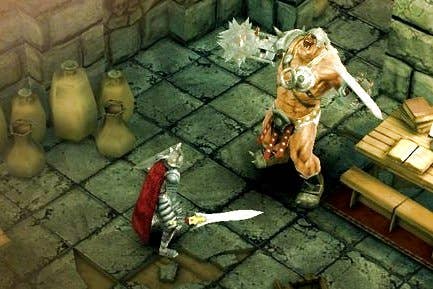Defiant Development: F*** free-to-play
Company director warns devs against playing at the "high stakes table"
It's not unusual for a developer to rage against free-to-play at a conference but Morgan Jaffit, director of Defiant Development, used his Casual Connect talk to warn developers about the dangers of entering the space without the proper experience.
"I don't give a shit about the morality side of things," he told attendees.
"The argument here really is a business argument. It's not whether free-to-play is good or bad, but it's whether it's a good or bad decision for the sorts of businesses that Defiant represents - reasonably successful, small, indie, social and mobile studios."

He explained that he had seen developers make good games and then apply free-to-play mechanics with little or no experience on how to do so. He compared that to sitting at the high stakes poker table, an attractive idea, but dangerous for those that aren't prepared.
"If you're asking the question of 'I'm wondering whether I'm making my next game free-to-play' the answer is no. If you have to ask the question you are not un-fucking-prepared. If you do not have the people on staff to make a free-to-play game you are not prepared and you shouldn't."
"You build games around your teams, and if your team doesn't have free-to-play built into its DNA you're going to have a hard time."
"If your team doesn't have free-to-play built into its DNA you're going to have a hard time"
He proposed a simple message, if you know how to make games you can make a living making games you like. Sitting at the high stakes table is not the only route. But if you're going to do it, do your research, use App Annie, find out what the hard numbers are for in-app purchases in the type of game that you want to make.
And Defiant Development can speak from experience, it released Heroes Call in 2012, an iOS dungeon crawler. He was happy to talk about the mistakes it made along the way.
"The way we did it was we gathered as much data as possible and we then proceeded to ignore it. There are so many ways to do it wrong. You will discover new and magical ways to fuck it up," he said to laughs from the audience.
"One of the ways we screwed up and one of the things that made the most dramatic difference was we ended up blowing our budget on polish which meant we then had to turn to a work for hire project almost immediately after release."
This mistake, which Jaffit put down to old console development habits, meant the full team wasn't available to support the game post release. The team also made mistakes with the backend that made it hard to tweak the game once it was live.
"We also made our initial monetization very aggressive and it made people sad and we listened to people who were sad and then we made it much less aggressive and made them happy, but then our monetization was terrible. We got less complaints, but we weren't really making much in the way of revenue from it."
And if you think a publisher will help, Jaffit argued that if you don't have the skills it's still not "a magic bullet." Publishers are unlikely to take on a game that isn't doing well, and they can't make a bad free-to-play game good.
He advised indies that the old model, making a game and selling it to people, was the right path for indies and would benefit them more than the games as a service model which was time-consuming and hard work. Sure, make the game free later on when it drops out of the charts, but don't make that your starting point.
Last year Defiant released Ski Safari, which was named Apple's game of the week in the US, Canada, Australia, Mexico and New Zealand and is priced at 99¢.

